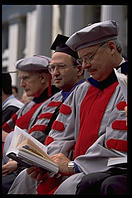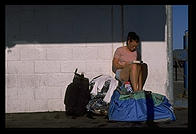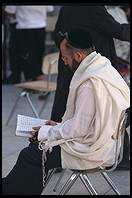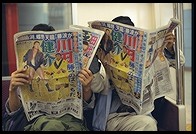

|
Booksrecommended by Philip Greenspun |
 I started this in April 1997. I'm going to try to write mini-reviews of
the books that I read and like. I'm not going to attempt to go back
through everything I read when I was actually reading (before I had Web
servers to maintain).
I started this in April 1997. I'm going to try to write mini-reviews of
the books that I read and like. I'm not going to attempt to go back
through everything I read when I was actually reading (before I had Web
servers to maintain).
Here goes...
(My friend Neil gave me this book, in honor of my own monster dog's first birthday.)
Angela's Ashes demonstrates that it is difficult to starve gracefully and unselfishly but that some people manage nonetheless. The rich, whether English Protestants or Irish clerics, don't come out looking too good. I finished the book just before Bill Gates topped the Forbes 400 again with his $38 billion.
"Unmarried men in their forties, if we don't subside entirely into the landscape, often lose important credibility and can even attract unwholesome attention in a small, conservative community. And in Haddam, in my new circumstances, I felt I was perhaps becoming the personage I least wanted to be and, in the years since my divorce, had feared being: the suspicious bachelor, the man whose life has no mystery, the graying, slightly jowly, slightly too tanned and trim middle-ager, driving around town in a cheesy '58 Chevy ragtop polished to a squeak, always alone on balmy summer nights, wearing a faded yellow polo shirt and green suntans, elbow over the window top, listening to progressive jazz, while smiling and pretending to have everything under control, when in fact there was nothing to control."
I think that with those two sentences, Ford managed to say what his book was about. So I'll shut up.
"What I did hate, though, and what finally sent me at a run out of town after dark at the end of the term, without saying goodbye or even turning in my grades, was that with the exception of Selma, the place was all anti-mystery types right to the core--men and women both--all expert in the arts of explaining, explicating and dissecting, and by these means promoting permanence. For me that made for the worst kind of despairs, and finally I couldn't stand their grinning, hopeful teacher faces. Teachers, let me tell you, are born deceivers of the lowest sort, since what they want from life is impossible--time-freed, existential youth forever. It commits them to terrible deceptions and departures from the truth. And literature, being lasting, is their ticket....
In my view all teachers should be required to stop teaching at age thirty-two and not allowed to resume until they're sixty-five, so that they can live their lives, not teach them away--live lives full of ambiguity and transience and regret and wonder, be asked to explain nothing in public until very near the end when they can't do anything else."
Oh yes, the writing... West's prose could easily pass for a New Yorker story circa 1985. Furthermore, his characters behave a lot like our contemporaries. None of this struck me as remarkable but I think it accounts for why he was so widely admired by good writers of his day and so roundly ignored by readers during the 1930s (perhaps 6,000 copies of his books were sold during his lifetime). Even if his writing style hadn't been so modern, releasing the bleak Miss Lonelyhearts in 1933 cannot have been an inspired marketing idea (the publisher went bankrupt just as the book was released).
If you want to read just one West novel, my personal choice would be Day of the Locust (1939), his last work. It is about the people destroyed by their dreams of California and Hollywood, seen through the eyes of a journeyman studio artist. He's obsessed with an aspiring actress, Faye Greener: "Her invitation wasn't to pleasure, but to struggle, hard and sharp, closer to murder than to love. If you threw yourself on her, it would be like throwing yourself from the parapet of a skyscraper. You would do it with a scream. You couldn't expect to rise again. Your teeth would be driven into your skull like nails into a pine board and your back would be broken. You wouldn't even have time to sweat or close your eyes."
The strangest novel in the collection is A Cool Million, wherein a Candide-like young man, Lemuel Pitkin, goes out to make his fortune in what a variety of Panglosses keep telling him is the Land of Opportunity. As in a Horatio Alger story, Pitkin meets a lot of rich and powerful men who are in a position to help him. West departs from Alger in that Pitkin is cheated and mutilated by all of his encounters with the rest of humanity.
"The Ministry of Truth--Minitrue, in Newspeak--was startlingly different from any other object in sight. It was an enormous pyramidal structure of glittering white concrete, soaring up terrace after terrace 300 metres in the air."Alexander backs up this polemic with convincing arguments that high-rise living removes people too far from the casual society of the street, from children playing in the yard, and that apartment-dwellers therefore become isolated.
Alexander spends a lot of time in this book trying to figure out how to restore the damage to our communities that have been done by automobiles. He argues for better public spaces and for more integration of children, old people, and workers. He argues for more access to water by more people.
Many of Alexander's arguments are against the scale of modern systems. Public schools spend a fortune on building and administration precisely because they are so physically large [I've seen statistics showing that our cities spend only about one-third of their budgets on classrooms and teachers]. If we had shopfront schools and fired all the school system personnel who don't teach, we might be able to get student-teacher ratios down to 8 or 10:1 without an increase in cost. Similarly, Alexander argues for smaller retail shops, smaller factories (or at least identifiable small workgroups within factories rather than hundreds of faceless cogs) and more master/apprentice instruction.
What if you like the depredations of modernity and aren't interested in a utopian world where basic human needs are met? Can you learn anything about architecture from this guy? Absolutely. You'll learn that light is everything. Your bedroom has to have eastern light so that the sun wakes you up. Your best living quarters should have southern light. All the rooms should have light from at least two sides, otherwise there will be too much contrast and you'll just have to draw the shades. If you've got kids, make them sleep and play in their own wing of the house. Build a realm for yourself and your wife on a different floor. Meet the kids in the kitchen.
To avoid cluttering my apartment, I give away virtually all the books that I buy these days. I'm keeping this one and plan to re-read it every year.
The famous University of Pennsylvania "water buffalo" case is here. MIT puts in a fairly impressive showing, notably our decision to pay administrators to watch porn movies to decide whether they were obscene. Under this policy, proposed in 1984, Dean James Tewhey prosecuted an MIT undergrad for showing Deep Throat, a film held by the Massachusetts courts to be acceptable under Cambridge's community standards. Under MIT rules, the undergrad, Adam Dershowitz, was not entitled to legal representation before the MIT Committee on Discipline (COD). However, he could bring a relative, so he asked his uncle, Alan Dershowitz, to come down the street from Harvard Law School. This resulted in an acquittal for young Dershowitz and some changes in MIT policy. COD hearings would no longer be open to the student press, students would no longer be entitled to bring a relative, and it would henceforth be forbidden to tape-record proceedings.
[Note: Tewhey is actually my favorite MIT administrator of all time because, after years of giving students lectures on how to run their romantic lives, his own affair with another MIT employee turned sour. They were both married (to other people). She accused him of following her around and harassing her. They both got restraining orders from the Massachusetts courts against each other. She asked MIT to fire him for harassing her. With about as much due process as Tewhey had ever given any of the students, MIT fired him. Or we said that we did. But then it turned out that we were paying him for not working for about a year after we'd allegedly fired him. And then he sued MIT in Middlesex Superior Court for wrongful discharge. And then we sort of lost track of James Tewhey.]
Kors is a scholar and Silverglate is a civil rights lawyer. So the book differs from what a journalist might have written in the provision of philosophical and legal underpinnings for all of the newsworthy cases. Most interestingly, the roots of speech limits on campus are traced back to Herbert Marcuse (the only philosopher ever to appear on the cover of TIME Magazine). Marcuse argued that as long as society was oppressed by the powerful, free speech does not help the weak. True toleration and liberation could only be achieved by withdrawing "toleration of speech and assembly from groups and movements which promote aggressive policies, armament, chauvinism, discrimination on the grounds of race and religion, or which oppose the extension of public services, social security, medicare care, etc."
I was recommending the book to a friend and she asked "Who is it written for?" We thought about it for awhile. It can't be the administrators because they presumably enjoy the status quo. It can't be the students because they are just passing through the university in order to pick up a credential. It can't be the professors because they've mostly abdicated control of the university to the administrators. Most faculty see themselves either as employees of a bureaucracy vastly more powerful than themselves or as low-grade autonomous entrepreneurs only loosely connected to the university.
In fact, there might not be anyone in the United States whose has both the power and the inclination to redress any of the wrongs outlined in the 400 pages of The Shadow University. That is a thought much scarier than any in the book itself.
Mourner: "It's a great honor, Mr. Linley. My eleven-year-old granddaughter studied your sonatina for her final exam in violin and really loved it."There is a lot of interesting material about successful British middle-aged men: "How properous, how influential, how they had flourished under a government they had despised for almost seventeen years. ... Nurtured in the postwar settlement with the state's own milk and juice, and then sustained by their parents' tentative, innocent prosperity, to come of age in full employment, new universities, bright paperback books, the Augustan age of rock and roll, affordable ideals. When the ladder crumbled behind them, when the state withdrew her tit and became a scold, they were already safe..."
Clive (the composer): "That's very nice to know." The thought of children playing his music made him feel faintly depressed.
McEwan is also interesting when writing about old friendships and jealousies, the struggle to create, and the pain of self-doubt about accomplishments. Bottom line: there is more than enough here to keep you thinking for three hours and it is a fun plot-filled three hours...
The book also has some interesting portions about the life of a poet and a writer (hint: don't try it unless you were born rich and aristocratic) and a particularly funny anecdote about how Oxford wouldn't accept a thesis from Graves because it was not written in standard academic style (I have some personal experience in this area). He worked it into an ordinary book instead.
"There are orphanages," he exclaimed to himself, "for children who have lost their parents--oh! why, why, why, are there no harbours of refuge for grown men who have not yet lost them?"
He ought to give up, retire from the game. At what age, he wonders, did Origen castrate himself? Not the most graceful of solutions, but then ageing is not a graceful business. A clearing of the decks, at least, so that one can turn one's mind to the proper business of the old: preparing to die.Academia and sex are just the hooks that get people to read into the interior of what is ultimately a very challenging work. You can read the 220 pages in two hours but you might be thinking about the ideas for a long time.
In this culture, where energy and egotism are rewarded in the young and good-looking, plain aging women are supposed to be self-effacing, uncomplaining--to take up as little space and breathe as little air as possible. All very well, she thinks, if you travel with someone dear to you or at least familiar: someone who will help you stow away your coat, tuck a pillow behind your head, find you a newspaper--or if you choose, converse with you.Much ink is spent on the life of the plain woman, notably the plain middle-aged woman:But what of those who travel alone? Why should Vinnie Miner, whose comfort has been disregarded by others for most of her adult life, disregard her own comfort? Why should she allow her coat, hat, and belongings to be crushed by the coats and hats and belongings of younger, larger, handsomer persons? Why should she sit alone for seven or eight hours, pillowless and chilled, reading an outdated copy of Punch, with her feet swollen and her pale amber eyes watering from the smoke of the cigarette fiends in the adjoining seats?
Within the last couple of years she has in a sense caught up with, even passed, some of her better-equipped contemporaries. The comparison of her appearance to that of other women of her age is no longer a constant source of mortification. she is no better looking than she ever was, but they have lost more ground. ... Her features have not taken on the injured, strained expression of the former beauty, nor does she paint and decorate and simper and coo in a desperate attempt to arouse the male interest she feels to be her due. She is not consumed with rage and grief at the cessation of attentions that were in any case moderate, undependable, and intermittent.On tourism:As a result men--even men she has been intimate with--do not now gaze upon her with dismay, as upon a beloved landscape devastated by fire, flood, or urban development. ...
His earlier anomie, Fred realizes now, was occupational. Psychologically speaking, tourists are disoriented, ghostly beings; they walk London's streets and enter its buildings in a thin ectoplasmal form, like a double-exposed photograph. London isn't real to them, and to Londoners they are equally unreal--pale, featureless, two-dimensional figures who clog up the traffic and block the view.
It was the usual mistake of a complex intelligence in assessing a simple intelligence... Like most people of literary sensibility, he had been unprepared, when it came down to it, for the obvious: a blunt, naked wielding of power.McCarthy has a very deft way of characterizing the students.
Badly prepared, sleepy, and evasive, they could nevertheless be stirred to wonder and pent admiration at the discovery of form and pattern in history or a work of art or a laboratory experiment, though ceding this admiration grudgingly and by degrees, like primitive peoples who must see an act performed over and over again before they can be convinced that some magic is not behind it, that they are not the dupes of an illusionist.The faculty don't come out too much better...
Whenever, during the summer, [Professor Aristide Poncy] took a party of students abroad under his genial wing, catastrophic events attended him. As he sat sipping his vermouth and introducing himself to tourists at the Flore or the Deux Magots, the boys and girls under his guidance were being robbed, eloping to Italy, losing their passports, slipping off to Monte Carlo, seeking out an abortionist, deciding to turn queer, cabling the decision to their parents, while he took out his watch and wondered why they were late in meeting him for the expedition to Saint-Germain-en-Laye. Returning home, usually minus one student at the very least, he always deprecated what had happened, remarking that there had been "a little mix-up" or that the Metro was confusing to foreigners.And finally there is ridicule for the whole idea of progressive education. From a discussion among the faculty...
What you're invoking, nevertheless, Domna, is a medieval standard of scholarship as an end in itself. Here at Jocelyn, I've been given to believe, we're after something different: an active, two-way relation between the student and the faculty-member. Great learning can be an impediment to this; it opens up too great a hiatus, as in Hen's case, between the student and the instructor. Hence we don't insist on the Ph.D. or even the Master's; in fact, we regard advanced degrees as a liability, if anything.Layered on top of all of this is a Rashomon-like exploration of how different events look when interpreted from different perspectives.
His woman at present was Mae. She was blonde, and slender, and gay: A Passionate flirt, So dumb that it hurt, And better for night than for day.
Pack this one on the plane to China!
... when I read the headline to an article in ... the San Francisco Chronicle (1 April 1997), I knew both it was not an April Fool's Day joke and that the fish was most likely a cichlid, and it was.Cichlids are freshwater fish that provide parental care for their children. They are among the most intelligent of fish. Among the thousands of species of cichlids, it is possible to find behavior that is familiar to students of human psychology. There are cichlid fathers that stay with the wife and kids when times are tough but desert to find a new mate if predation levels are low enough that the female and his offspring by her can survive on their own (cf. American ghetto life after Aid to Families with Dependent Children).
Man Chokes on Tropical Fish Bayou Visa, La. Stephen Hill Epperson, 36, popped a friend's 6-inch tropical fish into his mouth as a joke Sunday and died when it got stuck in his throat. The Jack Dempsey fish became wedged in Epperson's airway, said Dr. F.H. Metz, coroner for St. Mary Parish.The Jack Dempsey is indeed a cichlid and performed the typical response of a spiny-rayed fish when engulfed by a predator: It locked its fine spines in the upright position to thwart being swallowed. Had the fish been a soft-rayed fish, such as the goldfish that have so often been safely gulped down by college students, the unfortunate Mr. Epperson would still be alive.
If you decide to skim the book, make sure to read the last chapter carefully. It contains some important ideas about human impact on ecology.
"This comes of the error which I have often deprecated," said the elder Corey. "In fact I am always saying that the Bostonian ought never to leave Boston. Then he knows--and then only--that there can be no standard but ours. But we are constantly going away, and coming back with our convictions shaken to their foundations. One man goes to England, and returns with the conception of a grander social life; another comes home from Germany with the ntion of a more searching intellectual activity; a fellow just back from Paris has the absurdest ideas of art and literature; and you revert to us from the cowboys of Texas, and tell us to our faces that we ought to try Papa Lapham by a jury of his peers. It ought to be stopped--it ought, really. The Bostonian who leaves Boston ought to be condemned to perpetual exile."
Kramer's well-written, smoothly flowing book is about the same phenomenon on Cape Cod and how a representative couple of old-style Cape residents deal with it.
Caveat: It feels as though the psychiatrist author mined his patients' collective neuroses to build the characters in this book. This gives the characters a rich texture but it also is a bit scary. Is this what we (Americans) are really like? Are we all this damaged?
Black does not neglect the human side of this story. We learn that Hollerith named his cat Bismarck. We learn about Thomas J. Watson's history at National Cash Register, including his conviction in 1913 on federal charges of "criminal conspiracy to restrain trade and construct a monopoly", his firing by "The Cash", and his vow "I am going out to build a business bigger than John Patterson has."
The story of IBM's involvement with Hitler truly begins in 1933, when the German government set forth the goal of counting the 41 million people living in Prussia within just four months. The main goal was to identify the Jews among those 41 million. Hollerith equipment is not like a modern computer. It cannot be programmed by the end-user. IBM employees had to know the exact business goals of every customer so that they could lay out the columns on the punch cards and program the tabulating machines appropriately. In the case of the Prussian census, however, IBM went further than usual. Aside from the door-to-door work, the entire job was handled by IBM employees in an IBM facility. It was perhaps the first dotcom:
A continuous "Speed Punching" operation ran two shifts, and three when needed. Each shift spanned 7.5 hours with 60 minutes allotted for "fresh air breaks" and a company-provided meal. ... Free coffee was provided to keep people awake. A gymnast was brought in to demonstrate graceful aerobics and other techniques to relieve fatigue. .. When Jews were discovered within the population, a special "Jewish counting card" recorded the place of birth. These Jewish counting cards were processed separately."It would not have required sophisticated information technology to shoot some thousands of Jews and leave them in the street to rot. But the German goal was to confiscate Jewish assets, put Jews on trains to move them into ghettos, assign each person to some kind of job that would benefit the Reich, put those same people back on trains after the concentration camps were built, then work each one to death according to his or her skills in a way that would provide maximum benefit to the German war effort. When the punch cards were working smoothly, the Nazis were very successful; without punch card automation, the process was slowed substantially.
For example, in Holland the head of the census was Jacobus Lambertus Lentz, an energetic and diligent statistician. Thanks to his efforts, the Nazis were able to round up and ultimately kill 75 percent of Dutch Jews, despite their being embedded within an uncooperative civilian population (Lentz was never punished for his enthusiastic support of the German war against the Jews but ultimately was sentenced to three years in prison on unrelated charges). By contrast, the head of France's National Statistical Service in Vichy was René Carmille, a member of the Resistance. Carmille slowed things down, which helped Jews who'd moved from city to city. He instructed his staff not to bother punching column 11, which was supposed to identify Jews. Carmille pulled 100,000 Jewish cards out of the system and kept them in his office. The personal cost to Carmille was high. He was arrested by the SS in early 1944, tortured by Klaus Barbie, the Butcher of Lyon, and deported to Dachau where his death, as prisoner number 76608 on January 25, 1945, was recorded by the IBM punch card equipment in that camp (every concentration camp had a Hollerith Abteilung to make sure that employers of slaves got the required labor and that all potential labor was exploited). The Jews of France have Carmille to thank, however, as the Germans were only able to locate and kill 25 percent before Allied liberation.
Most of the solutions provided to the German government were developed by IBM's German subsidiary. However, the head office in New York provided substantial support before and during the war. For example, the Germans were chronically short of paper, particularly the high quality paper that was required for making punch cards. IBM shipped hundreds of millions of punch cards from the US, even after the shooting war started, to ensure that the Nazi's projects could go forward. IBM's main problem was getting its profits back to the US. "Nazi" stands for "National Socialism" and the German government insisted that profits remain inside Germany. IBM got around this problem to some extent by having its German subsidiary pay enormous patent royalties to IBM headquarters. When that wasn't enough, IBM Germany invested in Berlin apartment buildings.
Throughout the 1930s, T.J. Watson invested a lot of personal effort in helping Hitler's government. Watson used his company's reputation and power to encourage businessmen worldwide to continue trading with Germany. Watson pleaded for "an equitable redistribution of natural resources" and a rearmed Germany. In return Hitler honored Watson with the Merit Cross of the German Eagle with Star, the highest honor available to non-Germans.
IBM's support of the German war effort did not go unnoticed. The British complained "it is only too clear that where US trade interests are involved, these are being allowed to take precedence over 'hemispheric defense,' and ... over cooperation with us". Harold J. Carter, a US Department of Justice employee, conducted an extensive investigation of IBM starting in 1942. After interviewing IBM executives in New York and examining records, Carter concluded that, even during the war, IBM was micro-managing its German subsidiary through IBM NY and IBM Geneva. Carter was prevented from prosecuting IBM because high US officials saw IBM as such a critical vendor for its own wartime activities. IBM automated the US Army. IBM enabled the US to round up citizens of Japanese descent and send them to concentration camps. IBM would enable the US to govern recaptured European countries.
At the end of the war, with the help of the US Army, IBM quietly collected up all of its machines and assets. The German subsidiary alone was worth RM 56 million in 1946 and was turning a profit of RM 7.5 million. Nobody really asked what the machines had been used for until 1967 when IBM published a book entitled The History of Computing in Europe. There were quite a few chapters devoted to "The Solutions Company's" crucial role in supporting the Nazi war machine and death camp system. Somehow these escaped notice until the book had been printed and distributed. IBM hunted down all the copies and destroyed them and there the matter sat until 2001 when IBM and the Holocaust was published.
What can we learn from all of this history? First the dangers of the amoral multinational company. IBM employees were trained to see their company as more important than any mere government or moral system. Maintaining their worldwide monopoly was of primary importance and there was really no room on the spreadsheet for moral qualms. Second the consequences of US foreign policy that puts American business success ahead of human rights. We cared about human rights in Kosovo where it didn't cost us anything--Serbia isn't significant economically. We are willing to look the other way on human rights in China where competing against Japanese and European companies is critical.
"The heyday of the telegrapher as a highly paid, highly skilled information worker was over; telegraphers' brief tenure as members of an elite community with master over a miraculous, cutting-edge technology had come to an end. As the twentieth century dawned, the telegraph's inventors had died, its community had crumbled, and its golden age had ended."

| MIT Graduation can be a bit dull for the faculty unless they've got a novel hidden inside their programs. |

| From my Cape Cod essay |

| Girl waiting for the ferry to Martha's Vineyard, from my Cape Cod essay. |

| At the Western Wall (Israel) |

| In Prague. |

| In Tokyo. |
Did the Monster Dogs make a mistake by following the American Dream and coming to NYC. Would they have been better off staying in the Canadian-Prissian town after they destroyed their master? I don't know but would like to hear from others. I loved the book and sonce some of the dogs survived I would like to see a sequel.
-- Stew Albert, May 23, 1997
Per the recommendation of one of the reviewers at amazon.com and the author himself, I bought both A Pattern Language and A Timeless Way of Building. Pattern Language has the nuts and bolts, but Timeless Way is written with such lyrical beauty that I don't think you should miss it. Read both books together if you can, for each illuminates the other.D
-- David H Dennis, July 24, 1999
For readers of "A Pattern Language" who are as dense as I was, and can't figure out why it seems to contradict itself, remember this:It's a dictionary, not a novel.
Just as we do not construct sentence by using EVERY word in the english language at once, we do not devise our built environments by using every "word" in the "Pattern Language" at once.
Those interested in the physical as well as the philosophical aspects of Alexander's work should also seek out "The Linz Cafe" (regrettably out of print) and "The Production of Houses".
-- Ryan Young, July 28, 1999
Microserfs is my favourite novel. I first read it when I was in my third year of varsity and have re-read it many times since. It is a story that inspires me to work harder/longer/better _and_ to get a a life at the same time
-- Joe Mahoney, August 29, 2000
I am very surprised than you, Phillip, a great programmer, have read Independence Day. That talks very well about you.This novel is maybe the best one I have ever read. I don't know if you know who is Pío Baroja and Benito Pérez Galdós. They both are spanish, and I can recognice their style here.
I am a graduate in spanish literature, but I haven't read any other spanish novel after this.
If anybody reads in spanish, there is a long review about this written by me in www.multitextos.com/articulos/caos4.htm.
-- Albert Walnut, December 10, 2001
Nice writeup on IBM and the Holocaust - I was intrigued when the book was first released, but kind of forgot about it. I remember discussing it with a few co-workers (my career has been spent programming on IBM "big iron" mainframes) who dismissed it as bunk. I think these lessons will be missed though - and they're pertinent today just as they were yesterday with the onset of globalism and obliteration of borders. Going to get a copy, but I'll have to ask for it at the local library, as for the 1st time in my career, I'm an unemployed computer programmer.
-- Naum Trifanoff, December 15, 2001
It's nice to see a little literacy in a sea of techie stuff. By now you have probably read W.G.Sebald's Austerlitz. If you haven't, then you should. Then we can talk.
-- geoffrey james, December 1, 2002